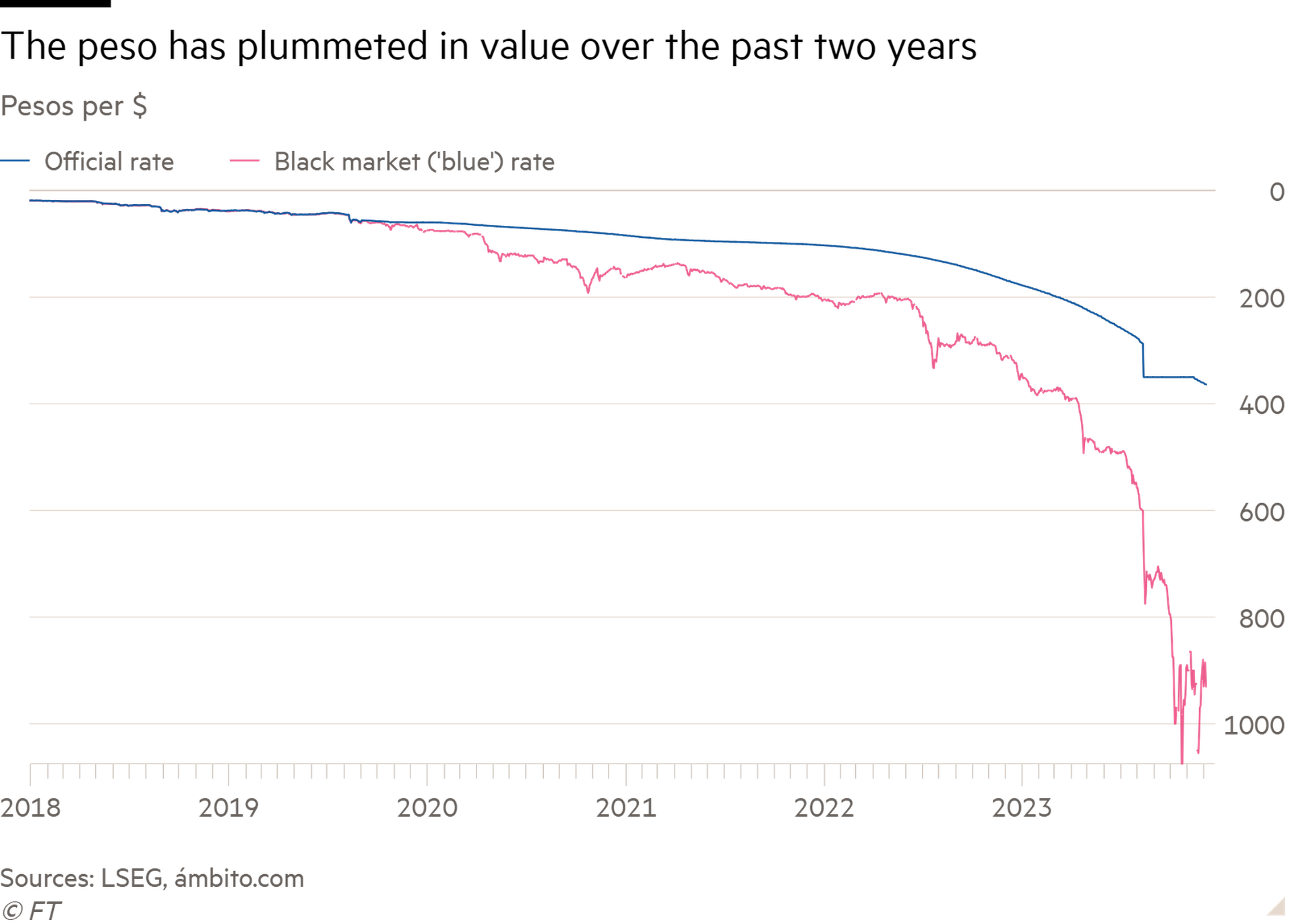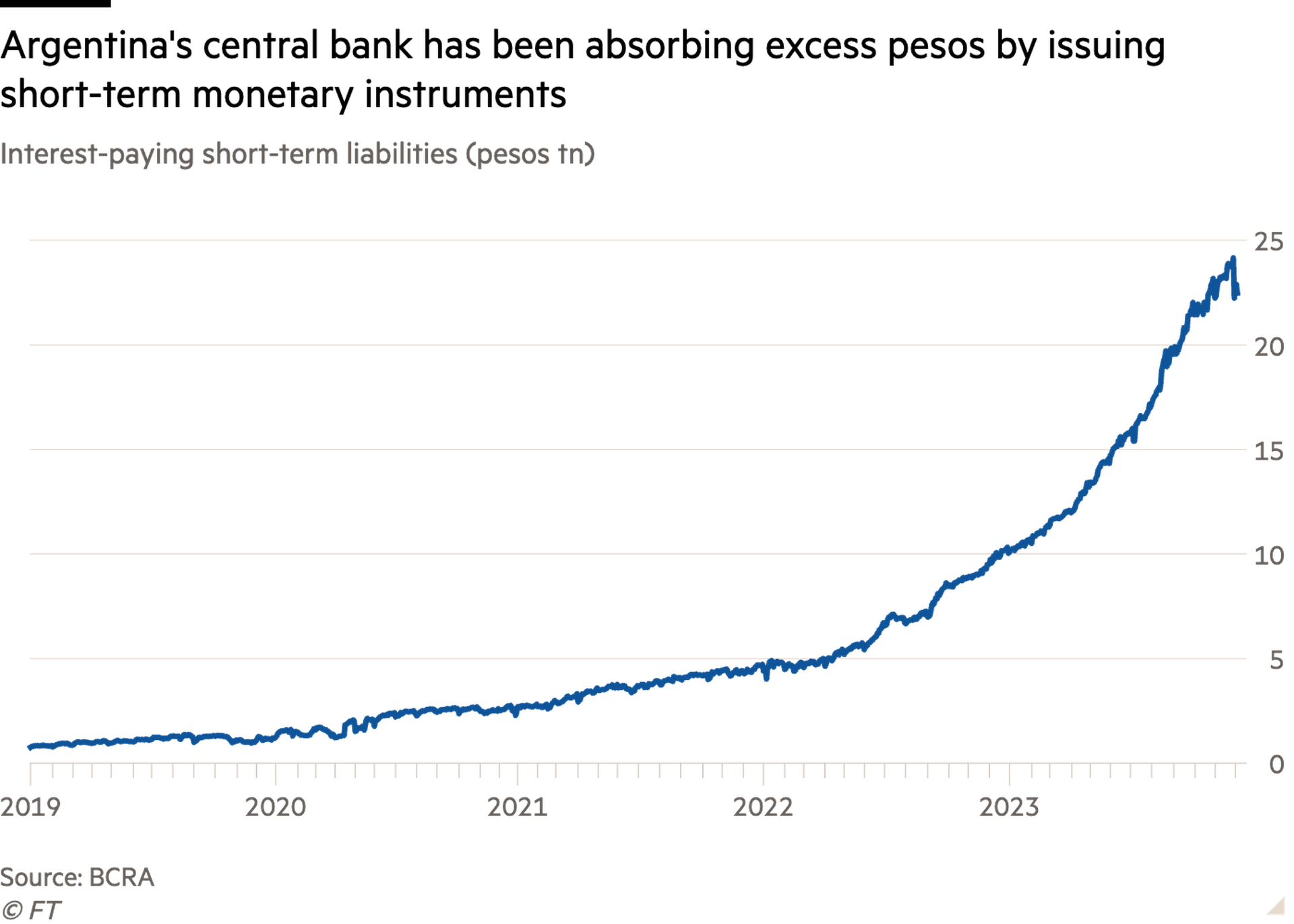尊敬的用户您好,这是来自FT中文网的温馨提示:如您对更多FT中文网的内容感兴趣,请在苹果应用商店或谷歌应用市场搜索“FT中文网”,下载FT中文网的官方应用。
Argentina’s new president, the self-styled anarcho-capitalist Javier Milei, takes on one of the world’s toughest economic challenges on Sunday.
自封为无政府资本主义者的阿根廷新总统哈维尔•米莱(Javier Milei)周日将面临世界上最严峻的经济挑战之一。
The country is a big food exporter and used to be one of the wealthiest nations in the developing world, but decades of mismanagement have wrecked the economy and created a web of artificial price and exchange rate controls that have produced huge distortions.
该国是一个粮食出口大国,曾经是发展中国家中最富有的国家之一,但数十年的管理不善击垮了经济,并形成了一个人为的价格和汇率控制网络,造成了巨大的扭曲。
A libertarian economist whose beloved pet dogs are named after ideological heroes such as Milton Friedman, Milei campaigned on promises of taking a chainsaw to the state, closing down the central bank and replacing the peso with the US dollar. But he has made a dramatic shift towards moderation since winning the election.
米莱是一位自由主义经济学家,他心爱的宠物狗们都以米尔顿•弗里德曼(Milton Friedman)等意识形态英雄的名字来命名。他在竞选时承诺,要对政府动用电锯,关闭央行,并用美元取代比索。但自从赢得大选以来,他却突然转向了温和派。
As Milei’s first day in office approaches, what are the main economic challenges that he will inherit?
随着米莱即将上任,他将面临的主要经济挑战是什么?
Chronic overspending
长期超支
At the root of Argentina’s problems is the government’s chronic overspending. The size of the state has almost doubled over the past two decades, with the government expanding the public sector payroll, handing out hefty fuel and electricity subsidies and boosting welfare programmes.
阿根廷问题的根源在于政府长期的过度支出。在过去的20年里,政府扩大了公共部门的工资,发放了巨额的燃料和电力补贴,并加强了福利计划,国家的规模几乎翻了一番。
Public sector employment rose 34 per cent between 2011 and 2022, while private sector jobs increased only 3 per cent in the same period, according to a report by the IERAL think-tank. This has led to continual budget deficits of more than 4 per cent of gross domestic product, despite tax levels that are well above the Latin American average.
智库IERAL的一份报告显示,2011年至2022年间,阿根廷公共部门的就业人数增长了34%,而同期私营部门的就业人数仅增长了3%。这导致预算赤字持续超过国内生产总值(GDP)的4%,尽管税收水平远高于拉美平均水平。

Decline in the peso
比索贬值
With the country cut off from borrowing on international capital markets since its ninth sovereign default in 2020, the current Peronist government has resorted to printing money to help fund the deficit. The money supply has exploded and the value of the peso has collapsed. Tight controls on foreign exchange have prompted a flourishing black market in the dollar and encouraged exporters to hoard goods, rather than ship them at artificially low official exchange rates. Argentina’s net international reserves are now negative, according to most economists.
自2020年发生第9次主权违约以来,该国已无法在国际资本市场上借款,现任庇隆主义(Peronist)政府已诉诸印钞来帮助填补赤字。货币供应量暴增,比索贬值。对外汇的严格控制导致了美元黑市的繁荣,并鼓励出口商囤积商品,而不是以人为压低的官方汇率发货。多数经济学家认为,阿根廷的净国际储备目前为负值。

Stubborn inflation
顽固通胀
The collapse in the peso’s value has fuelled inflation, which is now among the highest in the world. JPMorgan expects Argentina’s annual inflation to reach 210 per cent by the end of this year and warns that it is likely to rise further in the first half of next year — which could put it on a par with levels in Sudan and Zimbabwe. The central bank’s reference interest rate has shot up to 133 per cent to compensate depositors for rampant inflation.
比索贬值加剧了通胀,目前阿根廷的通胀率是世界最高之一。摩根大通(JPMorgan)预计,到今年年底,阿根廷的年通胀率将达到210%,并警告说,其明年上半年的通胀率可能会进一步上升——这可能会使阿根廷的通胀率与苏丹和津巴布韦的水平持平。该国央行的参考利率已飙升至133%,以补偿储户因严重通胀造成的损失。

Rising liabilities
负债上升
To soak up a large overhang of pesos in domestic markets, Argentina’s central bank has been issuing short-term interest-paying notes on local money markets. Those liabilities are more than 20tn pesos — nearly three times the monetary base — and generate hefty interest payments to the banks that hold them.
为了消化国内市场上大量过剩的比索,阿根廷央行一直在国内货币市场上发行短期付息票据。这些债务超过20万亿比索,几乎是基础货币的3倍,并向持有这些债务的银行支付巨额利息。

After a markets crisis in 2018, Argentina’s previous centre-right government turned to the IMF for a record-breaking bailout. It still owes the fund $43bn from that rescue, making it the biggest debtor to the Washington-based organisation. Argentina in 2020 also restructured $65bn of debt owed to private sector creditors. The IMF estimates that Argentina’s total foreign currency sovereign debt is $263bn.
在2018年的市场危机之后,阿根廷上一届中右翼政府向国际货币基金组织(IMF)寻求破纪录的救助。自那次纾困后,阿根廷仍欠国际货币基金组织430亿美元,这使其成为这家总部位于华盛顿的组织的最大债务国。阿根廷在2020年还重组了欠私营部门债权人的650亿美元债务。国际货币基金组织估计,阿根廷的外币主权债务总额为2630亿美元。
Cultural money habits
文化货币习惯
Argentines hold large amounts of dollars in cash within the country, as the US currency is widely used for savings and big transactions, such as property purchases. Central bank chief Miguel Pesce estimated in 2021 that Argentines held $200bn in cash within the country, which he said was 10 per cent of all US dollars in circulation in the world. A draft bill in Argentina’s Senate last year estimated that its citizens held another $418bn in mostly undeclared assets abroad.
阿根廷人在国内持有大量美元现金,因为美元被广泛用于储蓄和大宗交易,比如购买房产。阿根廷央行行长米格尔•佩谢(Miguel Pesce)在2021年估计,阿根廷人在国内持有2000亿美元现金,这占全球流通美元总量的10%。据阿根廷参议院去年提交的一份法案草案估计,该国公民还在海外持有另外4180亿美元的资产,其中大部分未申报。
The daunting task of straightening out Argentina’s dire public finances that Milei and his economy minister-designate Luis “Toto” Caputo face will include unwinding the current controls and distortions as well as stabilising the economy, all without triggering an explosion in inflation or a collapse in market confidence.
米莱和他任命的经济部长路易斯•卡普托(Luis Caputo)面临的艰巨任务是整顿阿根廷糟糕的公共财政,包括解除目前的控制和扭曲,以及稳定经济,并且所有这些都不能引发通胀的爆炸或市场信心的崩溃。
Alberto Ramos, chief Latin America economist at Goldman Sachs, said if Milei succeeded in curing Argentina’s economic ills, “it will be the best emerging market story in decades”.
高盛(Goldman Sachs)首席拉美经济学家阿尔贝托•拉莫斯(Alberto Ramos)表示,如果米莱成功治愈了阿根廷的经济弊病,“这将是几十年来最好的新兴市场故事”。
“He may try to do the right thing but may not be able to,” Ramos added, citing the difficulties of governing. Then there is the inherent volatility of the economic situation. “You are dealing with nitroglycerine. It can ignite overnight. Once you start the economic adjustment, you can lose control.”
拉莫斯补充说:“他可能会试图做正确的事情,但可能做不到。”他提到了执政的困难。其次是经济形势的内在波动性。拉莫斯表示:“你要对付的是硝化甘油。它可以在一夜之间点燃。一旦开始经济调整,你就可能会失去控制。”
Were that to happen, Ramos compared the challenge to a Formula One racing car that goes into a high-speed skid. “In this situation, there are no good or bad drivers because there is nothing you can do,” he said. “You take your hands off the wheel — and luck, the conditions and the state of the track will dictate where you end up and how much damage there is.”
如果发生了这种情况,拉莫斯将其面临的挑战比作一辆高速打滑的一级方程式赛车(Formula One)。他说:“在这种情况下,驾驶员没有好坏之分,因为你无能为力。你把手从方向盘上移开——运气、路况和赛道状况将决定你的最终结果和损失程度。”
Additional reporting by Ciara Nugent
西娅拉•纽金特(Ciara Nugent)补充报道